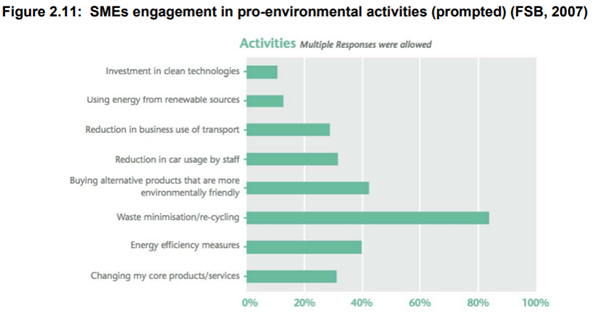Sustainability - by Lizzy Turek
Thursday, 21 April 2022
In 2019, the UK became the first major economy to commit to net zero carbon emissions by 2050, and businesses have noticed increasing urgency to make sustainability a key priority in their operations (Environmental sustainability: a strategic move for businesses | CBI). The Race to Zero campaign was launched by the UN on June 5th 2021 and CBI supports this new campaign, emphasising “Supporting our teams to make sustainable choices is critical to meeting our net zero goals – because if we don’t, our children will never forgive us” (Returning to the office: five ways to decarbonise your team’s commute | CBI).
Small-Medium Enterprises (SMEs) are responsible for a large proportion of environmental pressures. For example in 2006, SMEs generated 60% of commercial waste produced in England and Wales, and caused 43% of serious industrial pollution incidents (Environment Agency, 2006). 120 of 158 (76%) of companies fined £5,000 or more for environmental incidents were Small and medium-sized enterprises (Environment Agency, 2006).
However, SMEs have an advantage over larger organisations when it comes to addressing sustainability issues because their size means they are able to react quickly to changes in the business environment (Sustainability and Small to Medium Sized Enterprises - How to Engage Them | Cambridge Core). SMEs are adopting practical, incrementally positive environmental behaviours. The Figure below depicts that across all sectors, over 80 per cent of SMEs reported engaging in waste minimisation or recycling activities (Environment Agency Science Report “Small and Medium-sized Enterprises (SMEs): Understanding and Promoting Pro-Environmental Behaviour Change”).

Sustainability in action
All businesses, regardless of size, need to support their workforce to make sustainable choices, reduce commuting emissions and mitigate the impacts of climate change. Some measures could include:
- Remote and hybrid working allows businesses to retain the productivity, flexibility and environmental benefits of remote working, whilst preserving employee engagement and cultural unity associated with working in the office.
- Go Paperless while you might not be able to go completely paperless, reducing the amount of paper used is a great office recycling solution. Editing and proofing documents, taking notes and setting reminders can all be done electronically.
- Run efficient buildings
- Lighting switch to LED energy efficient light bulbs, turn off lights in unoccupied areas or where daylight is adequate and consider lighting sensors – movement/occupancy sensors alone can cut energy use by 30%.
- Electricity turn off computers/monitors when not in use, consider setting sleep programs on printers based on activity/use and switch off all communal equipment (printers, copiers, vending machines etc.) at the end of the day.
- Heating check and maintain boiler systems, ensure pipes are well insulated, thermostats are set correctly (Health and Safety Executive recommend 19°C in an office, 16°C in a workshop, or 11°C in very physical workplaces), use timers to preheat buildings based on occupancy, ensure doors / windows are sealed and not left open unnecessarily.
- Cooling maintain air conditioning systems, defrost freezers, invest in modern refrigeration technologies.
- Switch to greener energy by using an energy supplier providing 100% carbon neutral gas and 100% renewable electricity from a mixture of generation types including wind, solar and hydro.
- Produce and use your own power on-site from installing a wind turbine to fitting solar panels or connecting to a district heat network, there are options out there for generating your own electricity, selling what you don't use back to the grid.
- Recycle provide central waste and recycling stations, buy and promote the use of recycled products, sourcing cheaper, green alternatives and encourage the use of reusable coffee/tea cups and water bottles to reduce waste.
Travel
- Promote active travel walking and cycling is free, easy, accessible and a zero emissions mode of transport and has a range of health and wellbeing benefits.
- Encourage use of Public Transport to minimise the environmental impact of the commute. Consider flexible working to avoid the impact of any delays on public transport and consider offering travel benefits such as season ticket loans.
- Promote Car sharing informal or branded car share scheme is a particularly good option for organisations who are underserved by public transport and/or have limited parking. Consider investing in a car share app, so staff can commute together.
- Pooled cars/bikes for shared use during business hours and for conducting site visits will reduce the need for staff to use their own vehicles.
- Measure and manage your impact with Average Commuter Emissions Level (for benchmarking and comparing commuter emissions) you can track progress and measure the effectiveness of sustainable travel initiatives. Use this calculatorto view and tweak national averages data to get an idea of the size and scope of your commuter emissions challenges.
Lizzy Turek
Client Research Associate
Useful resources
For more information and ideas on ways to reduce costs in businesses, here are some key organisations:
A government produced guide for SMEs on how to improve energy efficiency and reduce energy consumption. Top tips on measures to implement, case studies and guidance.
The Carbon Trust
Provides free information, guidance, promotional materials for businesses in UK. Reducing energy bills and carbon emissions per sector. Advice on unsecured loans available to upgrade / replace equipment with energy efficient alternatives.
Energy Saving Trust
Provides advice for businesses on vehicle fleets, greener vehicles and efficient driving.
Green Business Network
Provides free access to environmental toolkits. Access to recycling database, detailing recyclers for most waste schemes (including paper, cardboard, plastic, metal and wood).
Green Grants Machine
Free directory on grants, loans and awards available to help businesses go green and save on energy bills.
WRAP
WRAP helps businesses to reduce waste and recycle more, making better use of resources. An informative website, sign posting businesses and community groups to help and advice.


